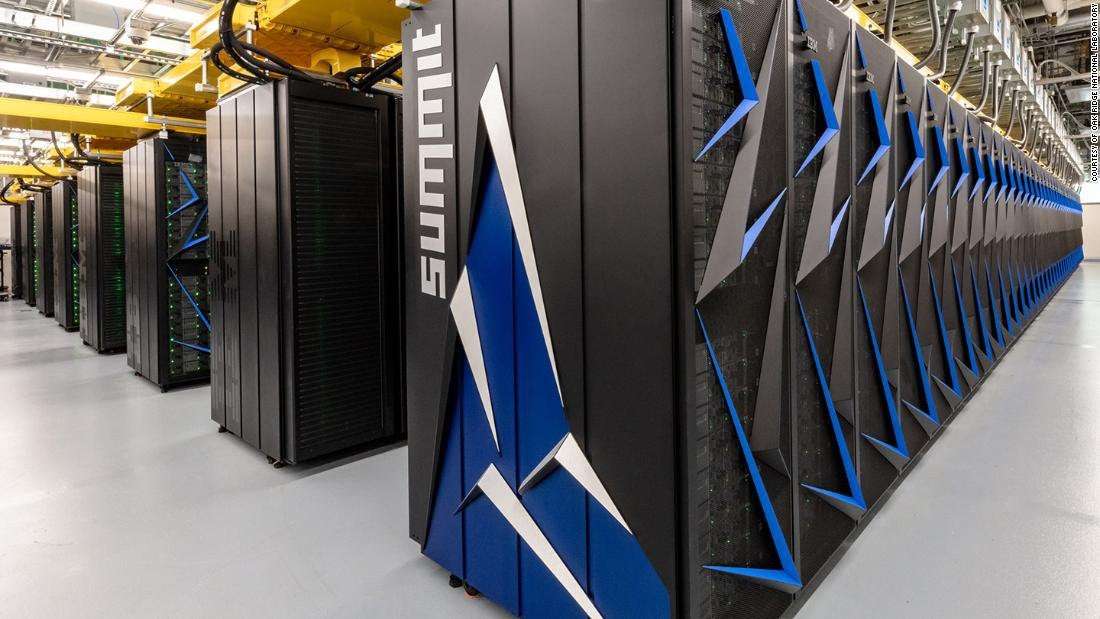(CNN) The novel coronavirus presents an unprecedented challenge for scientists: The speed at which the virus spreads means they must accelerate their research.
But this is what the world's fastest supercomputer was built for.
Summit, IBM's supercomputer equipped with the "brain of AI," ran thousands of simulations to analyze which drug compounds might effectively stop the virus from infecting host cells.
The supercomputer identified 77 of them. It's a promising step toward creating the most effective vaccine
Researchers at Oak Ridge National Laboratory published their findings in the journal ChemRxiv
Summit was built to solve the world's problems
Summit was commissioned by the US Department of Energy in 2014 for the purpose it's serving now -- solving the world's problems.
It's got the power of 200 petaflops, which means it has the computing speed of 200 quadrillion calculations per second, aka: It's 1 million times more powerful than the fastest laptop.
Summit, the world's most powerful supercomputer, modeled how different drug compounds might prevent the coronavirus from spreading to other cells.
At its station in Oak Ridge National Laboratory in Tennessee, Summit has identified patterns in cellular systems that precede Alzheimer's, analyzed genes that contribute to traits like opioid addiction and predicted extreme weather based on climate simulations.
Viruses infect host cells by injecting them with a "spike" of genetic material. Summit's job is to find drug compounds that could bind to that spike and potentially stop the spread.
Oak Ridge researcher Micholas Smith created a model of the coronavirus spike based on research published in January. With Summit, he simulated how the atoms and particles in the viral protein would react to different compounds.
The supercomputer ran simulations of over 8,000 compounds that could bind to the spike protein of the virus, which could limit its ability to spread to host cells. Summit identified 77 of them and ranked them based on how likely they were to bind to the spike.
The team will run the simulations on Summit again, using a more accurate model of the coronavirus' spike that was published this month
For all its power, though, Summit can only do so much. It provided the first step in analysis: identifying promising compounds. Experimental studies are required next to prove which chemicals work best.
"Our results don't mean that we have found a cure or treatment for the coronavirus," said Jeremy Smith, director of the University of Tennessee/Oak Ridge National Laboratory Center for Molecular Biophysics, in a statement
But the findings could inform future studies. And those studies are necessary to create the most effective coronavirus vaccine.
"Only then will we know whether any of them exhibit the characteristics needed to mitigate this virus."

WH7EVR on March 19th, 2020 at 23:03 UTC »
This really isn't work toward a vaccine, as vaccines don't introduce chemicals into the body to stop a virus. Vaccines introduce material into the body that harmlessly "trains" your body on how to fight the infection (produce antibodies).
This sounds more like a treatment, something that can be used to combat an existing infection.
Edit: some people are getting grumpy about how vaccines technically do use “chemicals” so I’ll clarify.
The article at hand is talking about using chemicals which can bind to the virus and prevent it from infecting host cells. This is a far cry from the chemicals involved in immunology, where were talking about specific proteins or components of the host virus which train your body to fight the original virus.
Edit 2: a few folks are pointing out that a chemical capable of neutering the virus could be used to create a vaccine, as a vaccine is often composed of deactivated or weakened virus material. That’s a good point, so I wanted to add it here to my top comment to make it more visible.
mysticalfruit on March 19th, 2020 at 22:40 UTC »
Me: "Mr. Supercomputer, how would you cure world hunger?"
Super Computer: "Kill all humans..."
Me: "That's what I thought..."
sherbetfountain on March 19th, 2020 at 21:55 UTC »
Are these the same 77 chemicals found in toilet paper?